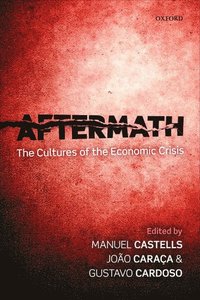
- Format
- Inbunden (Hardback)
- Språk
- Engelska
- Antal sidor
- 330
- Utgivningsdatum
- 2012-07-26
- Utmärkelser
- Manuel Castells was awarded the Holberg International Memorial Prize in 2012
- Förlag
- OUP Oxford
- Medarbetare
- Caraa, Joo / Cardoso, Gustavo
- Illustrationer
- illustrations
- Dimensioner
- 234 x 152 x 23 mm
- Vikt
- Antal komponenter
- 1
- ISBN
- 9780199658411
- 613 g
Aftermath
The Cultures of the Economic Crisis
- Skickas från oss inom 3-6 vardagar.
- Fri frakt över 249 kr för privatkunder i Sverige.
Passar bra ihop
De som köpt den här boken har ofta också köpt Who's Afraid of Gender? av Judith Butler (inbunden).
Köp båda 2 för 1608 krKundrecensioner
Fler böcker av Manuel Castells
-
Communication Power
Manuel Castells
-
The Power of Identity
Manuel Castells
-
The Internet Galaxy
Manuel Castells
-
The Rise of the Network Society
Manuel Castells
Recensioner i media
Anthony Giddens, Former Director of the London School of Economics and Political Science The discussion of the crisis of global capitalism offered in this book marks a breakthrough. The work ranges far more widely than the usual crop of purely economic analyses and rightly so.
Ulrich Beck, Professor of Sociology, University of Munich All economies are culturethat is the lens through which this compelling analysis looks at the on-going crisis of capitalism. From this follows the imperative: cooperate or fail! This book is a thought-provoking, interdisciplinary diagnosis of a world in turmoil.
Craig Calhoun, Director of the London School of Economics and Political Science Five years of crisis and upheaval have shaken the world. Aftermath takes up the question of where we go now. Castells and his collaborators show the depth of challenges, the diversity of global circumstances and paths, andhappilyreasons for cautious optimism amid the tumult. This is an important moment in history and an important book for this moment.
Övrig information
<br>Manuel Castells is University Professor and the Wallis Annenberg Chair of Communication Technology and Society at the University of Southern California. He is also Professor Emeritus of Sociology and Planning, University of California, Berkeley, where he taught for 24 years. He is a Fellow of the American Academy of Political and Social Science, of the Academia Europaea, of the Spanish Royal Academy of Economics, and of the British Academy. His main books include the trilogy The Information Age: Economy, Society, and Culture (Blackwell, 1996-2003) and Communication Power (OUP, 2009). He was a founding member of the board of the European Research Council and is a member of the Governing Board of the European Institute of Innovation and Technology. <p>Joao Caraca obtained a D. Phil. in Nuclear Physics at the University of Oxford and the Agregacao in Physics at the Lisbon Faculty of Sciences. He is Director of the Science Department of the Calouste Gulbenkian Foundation, Lisbon and also Full Professor of Science and Technology Policy at the Instituto Superior de Economia e Gestao of the Universidade Tecnica de Lisboa. He is member of the Governing Board of the European Institute of Innovation and Technology - EIT. He also integrates the Steering Group of the European Forum on Philanthropy and Research Funding and is President of the Advisory Board of the Portuguese Business Association for Innovation - COTEC. He was Science Adviser of the President of the Portuguese Republic (1996-2006), has published over 150 scientific papers, and co-authored Limits to Competition (1995), co-edited O Futuro Tecnologico (1999) and collaborated in Le Printemps du Politique (2007). <br>Gustavo Cardoso is Professor of Media and Society at IUL - Lisbon University Institute. His areas of interest are the cultures of the network society, the transformations of the notions of property, distribution and production of cultural goods, and the role of online social networking. Between 1996 and 2006 he was advisor on Information Society and telecommunications policies to the Presidency of the Portuguese Republic and in 2008 was chosen by the World Economic Forum as a Young Global Leader. His international cooperation in European research networks led him to work with IN3 (Internet Interdisciplinary Institute) in Barcelona, WIP (World Internet Project) at USC Annenberg, COST A20 "The Impact of the Internet in Mass Media" and COST 298 "Broadband Society." During the last five years he has been the Director of OberCom media observatory in Lisbon and is deputy chairman of the board of LUSA, the Portuguese global news agency.<br>
Innehållsförteckning
1. The Cultures of the Economic Crisis: An Introduction; PRELUDE; 2. The Rolling Apocalypse of Contemporary History; 3. The Separation of Cultures and the Decline of Modernity; WHICH CRISIS? WHOSE CRISIS?; 4. The Metamorphosis of a Crisis; 5. Financial Crisis or Societal Mutation?; DEALING WITH THE CRISIS; 6. Branding the Crisis; 7. In Nationalism We Trust?; 8. Crisis, Identity and the Welfare State; BEYOND THE CRISIS; 9. Surfing the Crisis: Cultures of Belonging and Networked Social Change; 10. Beyond the Crisis: The Emergence of Alternative Economic Practises; THE NON-GLOBAL GLOBAL CRISIS; 11. No Crisis in China? The Rise of China's Social Crisis; 12. A Non-Global Crisis? Challenging the Crisis in Latin America; AFTERMATH?


